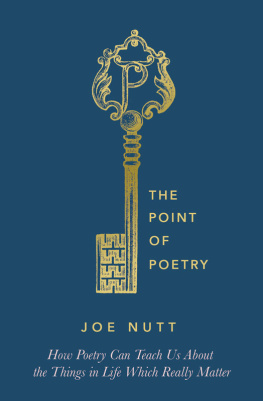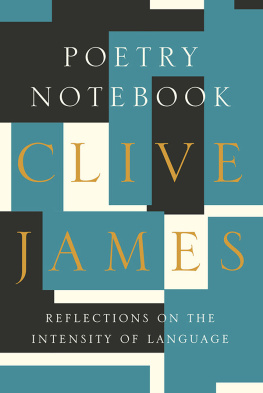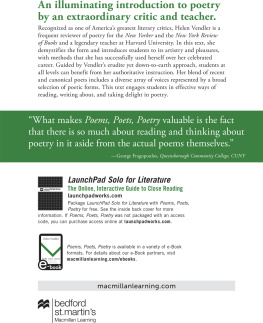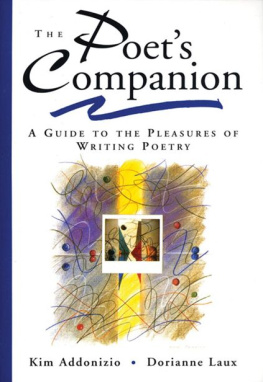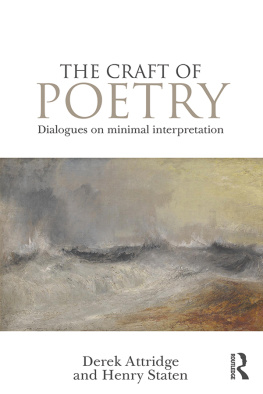The Poetry Handbook
The Poetry
Handbook
A Guide to Reading Poetry
for Pleasure and Practical Criticism
Second Edition
JOHN LENNARD


Great Clarendon Street, Oxford OX2 6DP
Oxford University Press is a department of the University of Oxford.
It furthers the Universitys objective of excellence in research, scholarship,
and education by publishing worldwide in
Oxford New York
Auckland Cape Town Dar es Salaam Hong Kong Karachi
Kuala Lumpur Madrid Melbourne Mexico City Nairobi
New Delhi Shanghai Taipei Toronto
With offices in
Argentina Austria Brazil Chile Czech Republic France Greece
Guatemala Hungary Italy Japan Poland Portugal Singapore
South Korea Switzerland Thailand Turkey Ukraine Vietnam
Oxford is a registered trade mark of Oxford University Press
in the UK and in certain other countries
Published in the United States
by Oxford University Press Inc., New York
John Lennard 1996, 2005
The moral rights of the author have been asserted
Database right Oxford University Press (maker)
First published 1996
Paperback edition reprinted with corrections 1996
Reprinted 1997 (twice)
Second edition with companion website 2005
All rights reserved. No part of this publication may be reproduced,
stored in a retrieval system, or transmitted, in any form or by any means,
without the prior permission in writing of Oxford University Press,
or as expressly permitted by law, or under terms agreed with the appropriate
reprographics rights organizations. Enquiries concerning reproduction
outside the scope of the above should be sent to the Rights Department,
Oxford University Press, at the address above
You must not circulate this book in any other binding or cover
and you must impose this same condition on any acquirer
British Library Cataloguing in Publication Data
Data available
Library of Congress Cataloging in Publication Data
Lennard, John.
The poetry handbook : a guide to reading poetry for pleasure and
practical criticism / John Lennard.2nd ed.
p. cm.
Includes bibliographical references and index.
ISBN 0199265380 (acid-free paper)
1. English poetryHistory and criticismTheory, etc.Handbooks, manuals, etc.
2. History languageVersificationHandbooks, manuals, etc. 3. Criticism
AuthorshipHandbooks, manuals, etc. 4. PoetryExplicationHandbooks,
manuals, etc. 5. Books and readingHandbooks, manuals, etc.
6. PoeticsHandbooks, manuals, etc. I. Title.
PR502.L38 2005
808.1dc22 2005021580
Typeset by RefineCatch Limited, Bungay, Suffolk
Printed in Great Britain on acid-free paper by
Clays Ltd, St Ives plc.
ISBN 0199265380 ISBN 9780199265381
1 3 5 7 9 10 8 6 4 2
For
ANNE BOWLER PUGH and ANNE BARTON
who taught me far more than these basics;
and for the late, much missed
JEREMY MAULE
who told me to write them down.
Cricket is an art. Like all arts
it has a technical foundation. To enjoy it
does not require technical knowledge, but
analysis that is not technically based is mere impressionism.
C. L. R. JAMES, Beyond a Boundary
Acknowledgements to the Second Edition
As well as renewing my thanks to those without whom this book would not exist at all, and giving proper thanks to those readers of the first edition whose feedback showed me how to do better, I must give special and happy thanks to Francis, David, and Jacqui Ingledew, whose friendship and exceptionally generous hospitality allowed me at last to visit Walcotts Caribbean. Francis was also instrumental in my invitation to teach online for Fairleigh Dickinson Universityfar and away the most interesting thing to have happened to me professionally in years, and the single most important impulse to revision. Jay Parini freely lent me his encyclopaedic anthologists knowledge of American poetry, and I have gratefully seized suggestions and ideas from Anne Henry, Alison Hennegan, and Dave Palfrey, who knows a great deal more about computers than I do. David Colclough very kindly supplied his article on Donne for the new DNB ahead of its publication, and Richard Todd, an editor of the variorum Donne, read the sections on The Flea and reassured me about their accuracy and sense. Alex Lindsay fielded questions about Dryden; Fiona Green allowed me to pick her poetic brains and let me borrow for months on end her facsimile of Dickinsons fascicles; and Anne Barton lent me her rare copy of The Girlhood of Shakespeares Heroines. Without Fiona Kinnear there would be no website.
Formal thanks are also due to Professor Jon Stallworthy, one of the editors of the Norton Anthology (as well as a lovely poet and once upon a time one of my doctoral examiners), for liaison about the timing and content of its fifth edition.
Nearing Forty is reproduced from Derek Walcotts Collected Poems 194884 (New York: Farrar, Straus and Giroux, 1986). Copyright 1986 by Derek Walcott. Reprinted by permission of Farrar, Straus and Giroux, Inc. and Faber and Faber Ltd. Sestina is reproduced from Elizabeth Bishops The Complete Poems: 19271979 (New York: Farrar, Straus and Giroux; London: Chatto & Windus, 1983). Copyright 1979, 1983 by Alice Helen Methfessel. Reprinted by permission of Farrar, Straus and Giroux, Inc. September Song is reproduced from Geoffrey Hills King Log (London: Andr Deutsch, 1968). Copyright 1994 by Geoffrey Hill. Reprinted by kind permission of Andr Deutsch, Houghton Mifflin Co., and Penguin Books Ltd.
John Lennard
Kingston, W. I.
June 2005
Acknowledgements to the First Edition
Beyond the debts acknowledged in the dedication I would like to thank those students who have harassed me into clarity, especially Dan Fugallo, Tess Grant, Rob Morris, Penny Taylor, and Nicky White; and those brave students, Adam Barnes, Andy Miller, and Simon Oastler, who have allowed their timed work to appear in the last chapter. My warmest thanks also to Jonathan Lloyd for reading many first drafts, and to Ljubica Dimitrijevic for putting up with me while he did so; to the anonymous first reader at OUP for the most helpful report I have ever had; to Jonathan Steinberg for boundless encouragement; to John Creaser for valuable commentary on the entire manuscript; to William Clocksin for help with the mathematical formula; to John Lyons for help with the Greek; to Gabriel Gbadamosi for a persuasive argument about phrasing; to Francis Ingledew for help with Walcotts West Indian experience; to Hugh Stevens for suggestions about Walcott and gender; to Frances Whistler for spotting (and being very kind about) a number of careless mistakes; and to Mary Luckhurst for everything.
J.C.L.
Cambridge
August 1995
Preface to the Second Edition
Since publication in 1996 The Poetry Handbook has by most accounts done its work reasonably well. As reviewers ignore textbooks, feedback was slow, but interesting when it did come, very positively, from teachers and students using the Handbook as a course-text; reader-reviews at Amazon.com were also good. The competition has sharpened a little, but sales remain strong and poetry is hardly a cutting-edge technology with necessarily short-lived manualsso why (besides marketing imperatives) should there now be a second edition?
Next page

